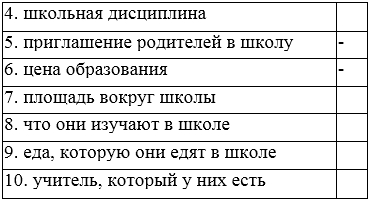Unit 1. № 20. ГДЗ Английский язык Enjoy English 10 класс Биболетова. Кто перевел? Поделитесь!
Read an extract from the book When 1 was young or Early 20th century and tick the things described in the text. Select and read the sentences aloud that explain your answers.
As soon as we were old enough to go to school, we walked there by ourselves. We were lucky since the school wasn’t far from our house. Some children had to walk a mile or more to get there.
There were three classrooms: one for the smallest
children, one for the middle class and a big room for the
oldest children. The headmaster, Mr Andrews, taught the
oldest children. He was very strict. No talking was allowed.
If you were bad, you had to come out and stand in front of
the whole class. If it was really serious, you had to hold out
your hand for the cane. It didn’t hurt too much.
The schoolyard was divided by a wall. The girls came
into school by the garden gate and the boys by the main
gate. It was funny really. Although boys and girls were
taught in the same class, we played in separate playgrounds
with that wall between us.
We started the day in the big room. We sang a hymn
and said a prayer. The little children learned to write by
drawing their letters in a sand tray. When you were older,
you used dip pens with ink. I remember we had to learn
our tables by heart and recite poetry. We did modelling
with dark-green plasticine, and the older girls learned to
sew and knit.
There were no school lunches. We went home for ours,
but children who lived too far away brought theirs to
school. In winter, Mr Andrews made a hot drink and the
children sat round the coal fire in the schoolroom to eat
Прочитайте отрывок из книги «Когда я был маленьким, или Начало
XX века» и отметьте информацию, которая описана в книге. Выберите и
прочитайте вслух выражения, поясняющие ваш вариант ответа.
Когда пришло время идти в школу, мы пошли учиться. «Нам повезло, что
школа была недалеко от нашего дома. Некоторые дети должны были идти
милю и даже больше, чтобы добраться до школы. Там было три классные
комнаты: одна - для самых маленьких детей, одна - для среднего класса и
большая комната для старших детей. Директор школы, господин Эндрюс,
учил старших детей. Он был очень строг и пресекал любые разговоры. Если
вы провинились, то в должны были выйти и стоять перед целым классом. Ес-
ли это было действительно серьезно, то в должны были протянуть руку для
тростника. Это не причиняло слишком много боли. Школьный двор был раз-
делен стеной. Девочки заходили в школу через ворота сада, а мальчики - че-
рез главные ворота. Это было действительно забавно. Хотя мальчикам и де-
вочкам преподавали в одном классе, мы играли на отдельных детских
площадках со стеной между нами. Мы начинали день в большой комнате. Мы
пели гимн и читали молитву. Маленькие дети учились писать путем рисова-
ния на подносе с песком. По мере взросления мы использовали ручки с чер-
нилами. Я помню, что мы должны были учить таблицы наизусть и рассказы-
вать их в стихах. Мы лепили из темно-зеленого пластилина, а девочки
старшего возраста учились шить и вязать. Не было никаких школьных обе-
дов. Мы ходили домой, а дети, которые жили слишком далеко, приносили еду
в школу. Зимой господин Эндрюс делал горячий напиток, и дети сидели во-
круг угольного костра в классной комнате, чтобы перекусить.

Люди добрые, не дайте пропасть на завтрашней контрольной. Как это решить?
Напишите уравнения реакций, при помощи (Подробнее...)
Read the text ‘‘Who’s There?” and find
out the English equivalents of the following
word combinations: (Подробнее...)
Translate the sentences written in bold
letters into Russian. Say why the past continu-
ous is used there.
What do you think is the main idea of the
story? Explain your choice.
1. Space is dangerous. (Подробнее...)
Look at the pictures. Make up a story. Write it down.
(Подробнее...)















